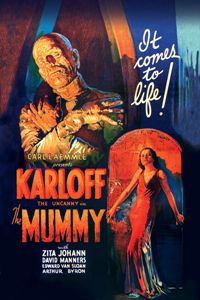
An archaeological dig, lead by Sir Joseph Whemple (Arthur Byron), unearths the mummy of Imhotep (Boris Karloff). A scroll buried with the mummy brings him back to life. Years later, Imhotep, now masquerading as modern Egyptian Ardath Bey, attempts to bring back his ancient love who has been reincarnated as Helen Grosvenor (Zita Johann), while Sir Joseph’s son Frank (David Manners) and occultist Doctor Muller (Edward Van Sloan) fight to stop him and save the girl who will be lost if he succeeds.
Of the original Universal Classic Monsters films, The Mummy is the most difficult for modern audiences to get into. While it is a Gothic tale, it is also rooted in 1932. The public—and press—had gone nuts over the opening of Tutankhamun’s tomb in 1922 and discussions of “the curse” were all the rage at cocktail parties. People took it seriously, and so this movie is presented seriously: no lighthearted moments or comic relief. Real people from the Tutankhamun excavation had died recently, perhaps—the papers suggested—from a real curse, so jokes would be in poor taste. And as this horror was in a faraway land, but current, The Mummy is made to look faraway, but current, with a flapper as our damsel in distress, and the then-popular slow melodrama as the story structure. For the details of that story, Dracula had been a big hit, so Universal saw no reason not to reuse its plot—placing it in Egypt was enough of a change. And when Imhotep displays memories of the ancient past, they are shown in the style of a silent film, as what would be more natural for the cinematic past in 1932 than a silent movie?
So The Mummy takes a different mindset. It was a mindset I found easy to get into as a child due to the general mystical, creepy feeling of the movie, but which eluded me as I got a bit older, as it is quite slow moving, and self-serious. However, now older still, I can again enter its world.
The connection to Dracula is closer than the plot (an evil, but in many ways sympathetic undead creature seeks a girl while an elderly occult doctor and a young romantic hero try to stop him) and the use of Swan Lake as its opening music. Screenwriter John L. Balderston was a writer on Dracula (as well as Frankenstein). Additionally he’d covered the opening of Tutankhamen’s tomb as a reporter. Actors Edward Van Sloan and David Manners were ported over from Dracula, and played essentially the same parts. And just as Van Helsing is annoying and “John” Harker is forgettable in that film, Doctor Muller gets on my nerves and Frank is a non-entity. Dracula’s acclaimed cinematographer Karl Freund was promoted to director. Dracula looks more like a Freund film than a Tod Browning one—Browning tended toward the lurid. Freund’s touches are visible throughout The Mummy (most obviously with the way the eyes are lit), and so is his restraint.
While it’s a good looking film, with some evocative set designs, The Mummy is rightfully remembered for two things: Jack P. Pierce’s makeup and Boris Karloff’s performance. As he’d shown with Frankenstein (and Dracula—yet another connection), Pierce was a genius at makeup design. The Mummy is amazing, both the fully wrapped version seen for only a few minutes, and as Ardath Bey, with the deep lines in his flesh. There wasn’t yet an Oscar for makeup, but they should have added one to give it to Pierce. The waking of the Mummy is one of the best scenes in horror history, showing little besides the movement of a hand and Karloff’s slowly opening eyes. It is frightening and memorable, and is a credit to both Pierce and Freund.
Karloff has no problem acting under that makeup (no visual problem; apparently it was very unpleasant to wear and have applied). He was a greatly underappreciated actor. He could mix menace and mystery with vulnerability. This movie would be a dud if the audience didn’t feel for Imhotep, but Karloff makes us care…makes me care.
The Mummy made it clear that Dracula and Frankenstein were not flukes. With it, Universal was now a monster factory, and Karloff was a star. And it’s a very good film, if not quite in the league of its brothers. Its pace is too slow, even with that correct mindset, and the ending is too sudden (another similarity to Dracula), and most any time spent without Karloff feels like wasted time. But Karloff is onscreen a great deal, and the strengths outweigh the weakness. If you don’t like it, wait ten years, and try again.